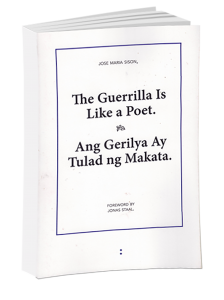 Jose Maria Sison.
Jose Maria Sison.
Foreword by Jonas Staal.
2013
ISBN: 978-90-817091-8-7
296 pages | 5,25″ x 8″
Language: English, Pilipino
Price: 15,00 Euro
This book is titled after the world-renowned poem of Jose Maria Sison, “The Guerrilla Is Like a Poet,” which celebrates with natural imagery and in a lyrical way the Filipino people’s revolutionary struggle for national liberation and democracy against foreign and feudal oppression and exploitation. The book contains poems from Sison’s Prison and Beyond, which won the Southeast Asia WRITE Award, as well as new poems that further develop the theme of struggle for national and social liberation as well as exile. It also carries articles of creative writers on the significance and relevance of his poetry. Sison is a Filipino revolutionary with extensive guerrilla experience and has been a recognized poet since his student days at the University of the Philippines. The publication of this book has been sparked by the effort of the Academy for Cultural Activism of the New World Summit to present the people’s culture in the national democratic struggle in the Philippines.
AUTHOR’S PREFACE
I am delighted and honored that my book of poems, The Guerrilla Is Like a Poet and Other Poems, is published in connection with the project of the Academy for Cultural Activism to present to artists and students in The Netherlands the role of art and literature in the struggle of the Filipino people for national liberation and democracy.
I thank Jonas Staal of the Academy for Cultural Activism and Dr. Vincent van Gerven Oei of Uitgeverij for asking me to make the selection of poems, juxtapose the Pilipino and English versions and include commentaries that shed light on the significance, content and style of the poems and on my track record in the new democratic revolution of my people and the place that I have earned in Philippine literature.
I have divided the poems into three parts. Part I is titled “The People’s Resistance” and the poems are about the revolutionary struggle of the toiling masses against their foreign and feudal oppressors. Part II is titled “Detention and Defiance” and the poems are about my torture and imprisonment by the Marcos fascist dictatorship from 1977 to 1986. Part III is titled “The Struggle Continues” and the poems are about the perseverance of the Filipino people and myself in struggle.
The poems in Parts I and II are selected from my book of poems, Prison and Beyond, which won the Southeast Asia WRITE Award for poetry in 1986 and which carries the poem, “The Guerrilla Is Like a Poet.” Part III of the present book includes poems that I have written while in exile as a political refugee in The Netherlands.
These more recent poems reflect the continuous suffering and struggle of the Filipino people, the depredations of the imperialist policy of neoliberalism, my work for international solidarity along the anti-imperialist and democratic line as chairperson of the International League of Peoples’ Struggle and my subjection to “terrorist” blacklisting initiated by the US government and to arrest and solitary confinement by the Dutch government on false charges of murder by the Philippine government.
In dovetailing the Pilipino and English versions of the poems, I was assisted by Pepe Luneta, Cora Mercado, Gelacio Guillermo and Julie de Lima who are experts in the two languages. I made the final decision on variations or differences of translation. They are not responsible for any error or deficiency in translation.
In this preface, I say just enough to open the door and welcome your reading of the poems. I hope that you understand and appreciate how I try to express within the brevity of poems, so much thought and feeling, which I would have otherwise expressed in volumes of prose.
I have included in the book as Part IV a brief statement of mine on the literary craft and commitment and the commentaries on my poetry by Filipino colleagues who are renowned in the Philippines and abroad as teachers of literature, literary critics and practising poets. For the commentaries and appreciation for my poetry, I thank Prof. E. San Juan, Jr.,
Dr. Elmer Ordoñez, Prof. Bien Lumbrera, the late Petronilo Bn. Daroy, the late Alfredo Salanga, Gelacio Guillermo, Nonilon Queaño, Luis V. Teodoro and Edgar Maranan.
I take this opportunity to express my admiration and gratitude to Jonas Staal and all his colleagues in the New World Summit (NWS) for having provided democratic space to the Filipino people’s struggle for national liberation and democracy. I appreciate the artistic way that NWS creates the architectural venue for the alternative parliament and for the expression of ideas excluded by those who wield power and amass private wealth.
In the First New World Summit in Berlin in 2011, the National Democratic Front of the Philippines (NDFP) was featured as one of the major national liberation movements in the world. Luis Jalandoni had ample opportunity to present the revolutionary mission and vision of the NDFP.
In the Second New World Summit in Leiden in 2012, I was given the privilege of being the main speaker to articulate the Filipino people’s democratic program and struggle for national and social liberation, to express my grievance against the “terrorist” blacklisting and to expound on the NDFP desire for a just and lasting peace in pursuing peace negotiations with the Manila government.
I am elated that the NWS and its founder Jonas Staal have proceeded to create the Academy for Cultural Activism. I believe that this endeavor will encourage artists and teachers of art to imbue their work with the revolutionary spirit and carry forward the necessary progressive and fruitful dialectical relationship of art and democratization towards a new and better world of greater freedom, social justice, all-round development and international solidarity of the people.
Jose Maria Sison
1 September 2013